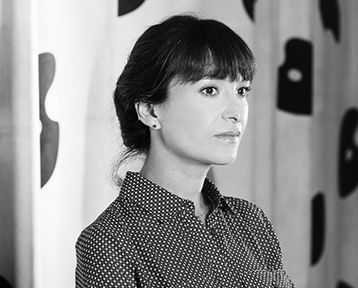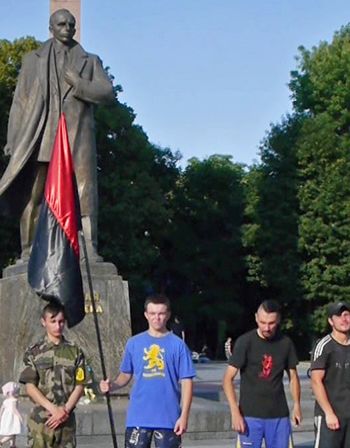A film by Ekaterina Shapiro-Obermair and Alexandra Wachter
de-fac-to
30. 7. 19, 7:30 p.m. – 8:30 p.m.
de-fac-to (HD video, 32 min, 2018, Ukrainian, Russian, and English with English subtitles) deals with the appropriation and reinterpretation of history within a post-factual society. Constructed similarly to a calendar, this work shows annual memorial rituals, events relating to World War II, celebrated by diverse political, social and ethnic groups. Attention is centred on the formal vocabulary and the performative character of the events. Despite the serious nature of the historical background, the overlapping of several semantic levels leads repeatedly to involuntary situational comic effects. The film illustrates the complexity of the coexistence of opposing lifeworlds in a post-Soviet town. By way of well-known historical circumstances, we are plunged into regional conflicts and conventions. The work, filmed in Lviv, is a collaboration between artist Ekaterina Shapiro-Obermair and historian Alexandra Wachter.
The film will be followed by a conversation between the artist and historian Albert Lichtblau.
Admission for Summer Academy students: € 3, regular ticket € 6
key data
- Date
- 30. 7. 19, 7:30 p.m. – 8:30 p.m.
- Venue
- Das Kino
Ekaterina Shapiro-Obermair
Ekaterina Shapiro-Obermair, born in Moscow in 1980, has lived and worked in Vienna since 2004. In 2018 she received a state grant from the Austrian Federal Chancellery, in 2017 the prize from the provincial capital Innsbruck (AT) at the 35th Austrian Graphic Arts Competition and the Theodor Körner Sponsorship Award, in 2015 the Chimera Art Award in Budapest and in 2014 a one-year scholarship from the Pollock-Krasner Foundation, New York, NY (US). She works in a variety of media, though all her projects involve printing. Her themes are appropriation of historical narratives, dealing with post-factual knowledge, and interaction of form and ideology, often focusing on various aspects of Soviet and post-Soviet art and culture, but also on a mediareflexive consideration of Modernism and Abstraction.
Exhibitions
Solo exhibitions
2018 Anschluss (with Hannes Zebedin), Ve.Sch kunstverein, Vienna. 2016 Double Bind, Ani Molnár Gallery, Budapest. 2015 Chimera Art Award, Chimera Project Gallery, Budapest. 2012 Sprechen Sie mit dem Fahrer, damit er nicht einschläft!, Galerie 5020, Salzburg (AT). us and them, Ve.Sch, Vienna.
Group exhibitions
2018 Re-Appropriating History, FLUC, Vienna. 2017 Genosse. Jude. Wir wollten nur das Paradies auf Erden, Jüdisches Museum, Vienna. 35. Österreichischer Grafikwettbewerb, Galerie im Taxispalais, Innsbruck. 2017 Birobidzhan: an artistic study of the Russian Federation’s Jewish Autonomous Oblast, Birobidzhan Regional Philharmonic, Birobidzhan (RU). 35. Österreichischer Grafikwettbewerb, Galerie im Taxispalais, Innsbruck (AT). 2015 Beyond the Obvious – Contemporary Women Artists from CEE, Deák Erika Galéria, Budapest. Tales of Two Cities, Jewish Museum am Judenplatz, Vienna. 2014 Tales of Two Cities, Moscow Museum of Contemporary Art, Moscow. [silence] – A Holocaust Exhibition, Ludwig Múzeum Budapest, Budapest. 2012 Critical Alliances, Croatian Association of Visual Artists (HDLU), Zagreb.
Publications
Patrick Urwyler (ed.): Award Winners Exhibition 2015, exh. cat., Chimera-Project Gallery, Budapest 2016.
Astrid Peterle (ed.): Tales of 2 Cities, exh. cat., Jewish Museum, Vienna 2015.
Katalin Timár (ed.): [silence] – A Holocaust Exhibition, exh. cat., Ludwig Múzeum Budapest, Budapest 2014.
Katharina Ritter, Ekaterina Shapiro-Obermair, Dietmar Steiner, Alexandra Wachter: Soviet Modernism 1955–1991. Unknown History, Park Books-Verlag, Zurich 2012.
Ekaterina Shapiro-Obermair, Wolfgang Obermair (ed.): The Great Moscow, that Never Was, schlebruegge.editor, Vienna 2008.

Albert Lichtblau
Albert Lichtblau studied History and Political Science at the Universität Wien, Vienna. He teaches at the Department of History at the Universität Salzburg and is the deputy director of the Centre for Jewish Cultural History.
